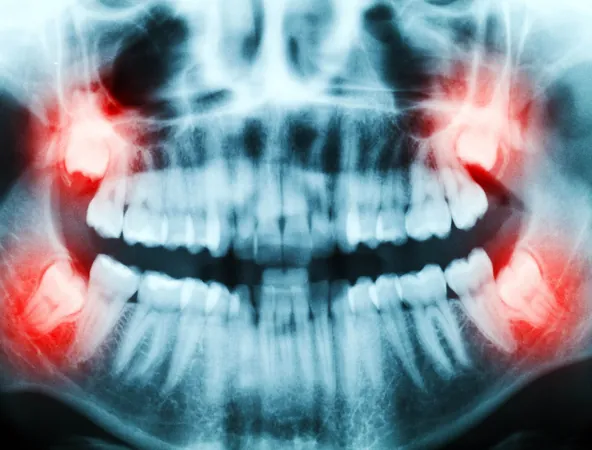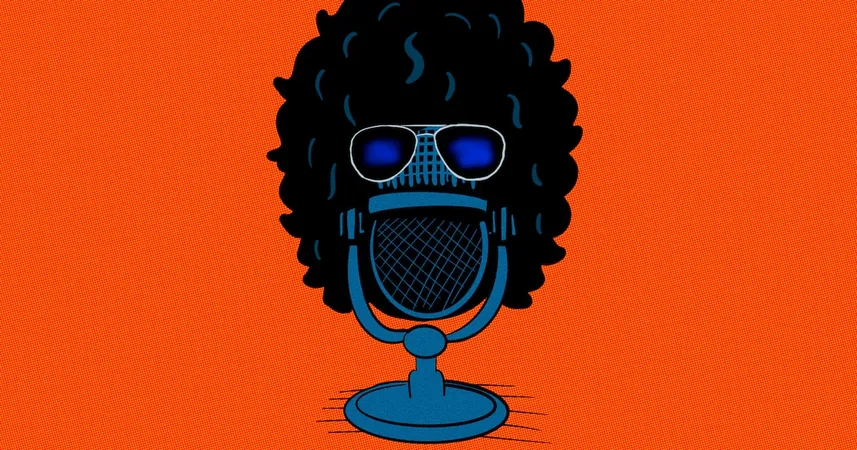
Unlocking the Hidden Power of Wisdom Teeth: The 'Medical Gold' That Could Change Everything!
2025-06-28
Author: Ming
Every year, millions of Americans bid farewell to their wisdom teeth, dismissing them as mere dental debris. But what if these molars are actually reservoirs of extraordinary healing potential? Recent groundbreaking research reveals that the stem cells nestled within wisdom teeth may play a pivotal role in combatting serious diseases.
A Routine Visit Could Be Life-Changing
Imagine your next dental appointment not just as a check-up, but as the starting point for a tailored medical strategy! Researchers led by Dr. Gaskon Ibarretxe from the University of the Basque Country have discovered that wisdom teeth contain dental pulp, a soft core packed with stem cells capable of regenerating bone, cartilage, and even nerve tissue.
The Secret Life of Dental Stem Cells
Within each wisdom tooth lies a soft-core called dental pulp, a space teeming with undifferentiated cells. These cells can transform into functional neurons, heart muscles, or bone when prompted in a lab, showcasing their incredible versatility. Ibarretxe's team successfully converted these pulp cells into neuron-like cells capable of firing electrical signals, a crucial step in repairing damaged neural circuits.
From Trash to Treasure: The Harvesting Process
Did you know that around 10 million wisdom teeth are extracted in the U.S. annually, mostly ending up in the biomedical waste bin? Each of these teeth could be a goldmine of living tissue. Dentists often perform these extractions on young adults, an optimal age for high-quality pulp cells. Innovative labs now collaborate with oral surgeons to process these teeth, preserving valuable stem cells in liquid nitrogen for potential therapeutic use.
Dental Stem Cells: A Revolution in Regenerative Medicine
Once discarded, wisdom teeth are now being viewed as long-term medical assets. Companies offer preservation kits that ensure the viability of dental stem cells during transport. Unlike embryonic stem cells, dental pulp stem cells come with minimal ethical concerns, making them a viable choice for expanding access to personalized therapies.
Potential to Combat Life-Altering Diseases
Preclinical studies suggest that these dental stem cells could alleviate symptoms of conditions like Parkinson's disease by regenerating lost dopamine-producing neurons. Additionally, research in Alzheimer’s indicates that these cells secrete growth factors that protect brain synapses and potentially slow the decline caused by toxic protein buildup.
Creating Your Own Biobank: The Future of Medicine
Going the route of dental stem cell banking means bypassing donor-rejection worries and shortening treatment timelines. The procedure is straightforward: oral surgeons can easily store extracted teeth for transport to labs, where the processing of cells happens swiftly. Though the cost is similar to cord-blood banking, the long-term benefits could be immense.
Broader Applications Beyond Neurology
The capabilities of dental stem cells extend beyond neurologic diseases. These cells demonstrate impressive abilities to repair jawbones post-tumor surgery and have shown promise in cardiac applications, where they may enhance heart function. Furthermore, their potential in joint repair could revolutionize orthopedic treatments, making these cells a treasure trove for various medical fields.
A Bright Future Awaits: Overcoming Challenges
While the future looks bright, researchers stress the importance of gathering long-term safety data and ensuring these cells integrate properly without causing tumors. Upcoming multicenter trials aim to assess the efficacy of pulp cell implants against conventional deep-brain stimulation for movement disorders.
Conclusion: Don’t Dismiss Those Molars!
Before tossing out your wisdom teeth, consider this: they might house the very solution to conditions like Alzheimer’s or spinal injuries. As researchers delve deeper into their potential, the humble wisdom tooth could transform from a dental nuisance into a crucial ally in the quest for advancements in medical treatments.


 Brasil (PT)
Brasil (PT)
 Canada (EN)
Canada (EN)
 Chile (ES)
Chile (ES)
 Česko (CS)
Česko (CS)
 대한민국 (KO)
대한민국 (KO)
 España (ES)
España (ES)
 France (FR)
France (FR)
 Hong Kong (EN)
Hong Kong (EN)
 Italia (IT)
Italia (IT)
 日本 (JA)
日本 (JA)
 Magyarország (HU)
Magyarország (HU)
 Norge (NO)
Norge (NO)
 Polska (PL)
Polska (PL)
 Schweiz (DE)
Schweiz (DE)
 Singapore (EN)
Singapore (EN)
 Sverige (SV)
Sverige (SV)
 Suomi (FI)
Suomi (FI)
 Türkiye (TR)
Türkiye (TR)
 الإمارات العربية المتحدة (AR)
الإمارات العربية المتحدة (AR)